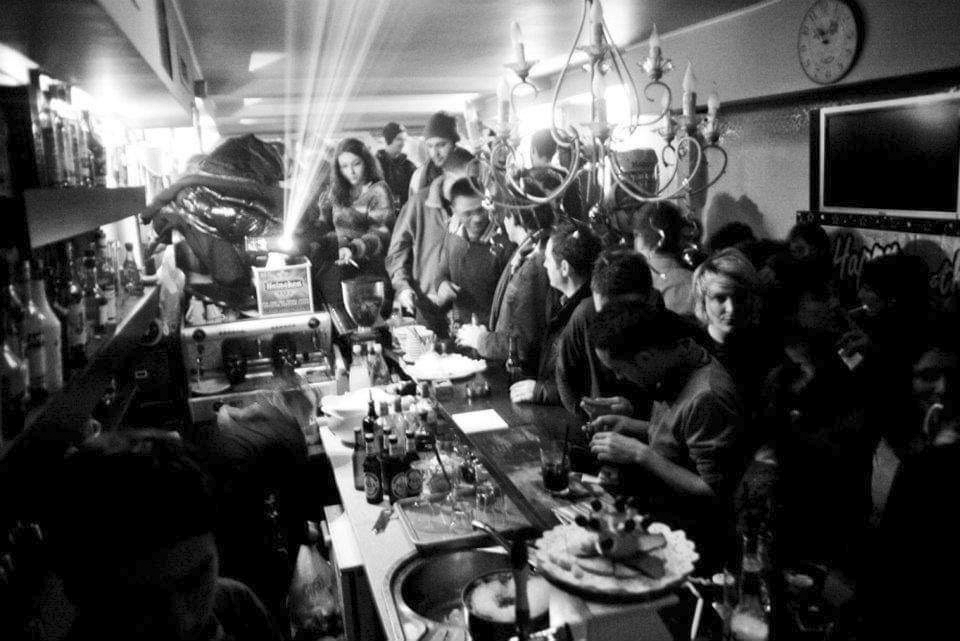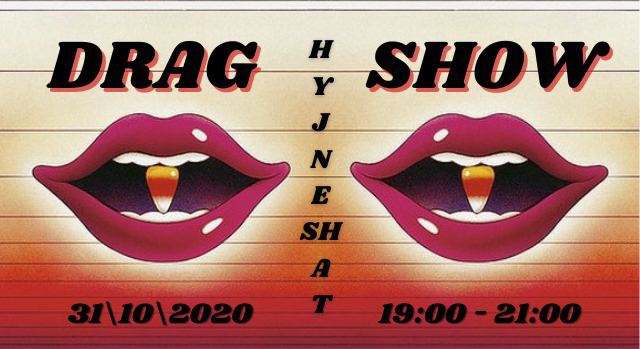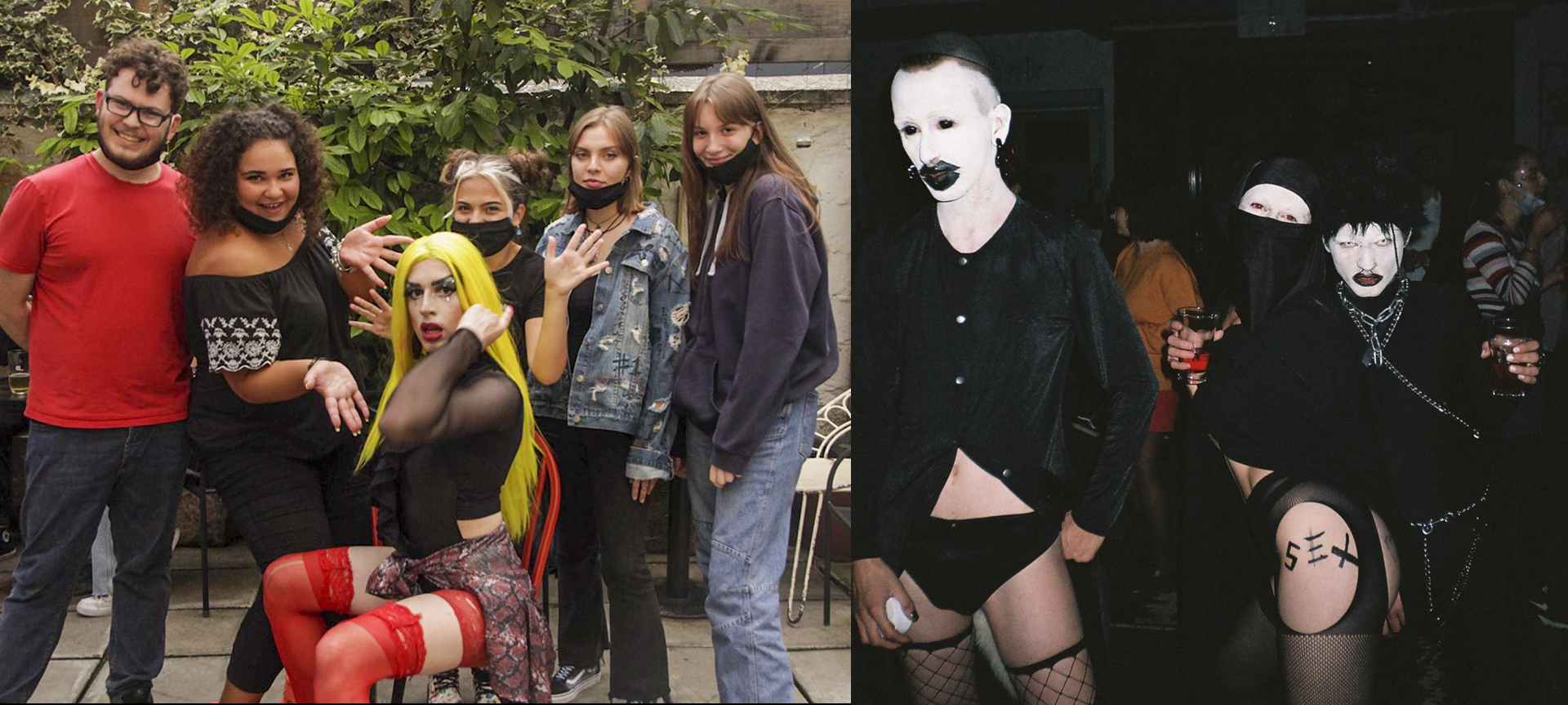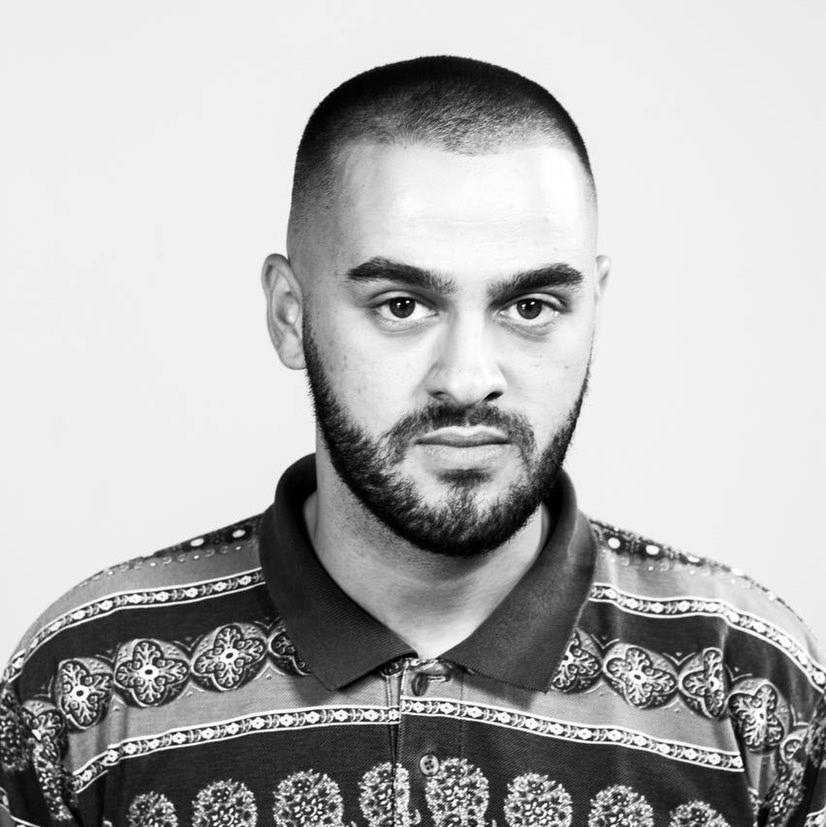In the suburbs of Prishtina, in a hotel ballroom where young married couples usually pass among the guests who sing and dance in their honor. But on that day in 2007, there was a slightly different passing though. Tens of people excitedly waited for this gathering; to be finally freed from daily oppression and to be themselves with no conditions and fear of others.
Miss Trans Kosova, the beauty parade held for three consecutive years up to 2010, brought together a part of the LGBTQ+ community in Kosovo in a safe space – in a hotel owned by a transgender woman. This competition would crown the winner Miss Trans.
Arbër Nuhiu, co-organizer of this event, points out that it was a form of expression for members of the queer community that served as a bridge between them, and at the same time as an empowering tool. As an LGBTQ + rights activist, he has closely followed the development of queer culture in the country from the 2000s to the present, and remembers pieces of its recent history.
“The opportunity to gather today like old times has been much smaller; meetings, gatherings have always been hidden for security reasons,” he recalls. “After [the LGBTQ+] center was opened in Prizren in 2004, queer people have usually gathered on Saturdays in larger numbers and together they were entertained with different songs.”
Nuhiu says that during 2004-2010, the gatherings in the only safe spaces in Prizren and Mitrovica not only had immediate importance for the LGBTQ+ people, but they have also positively impacted the development of queer culture since some of the first organizations of the 2000s come from there. During these gatherings, queer people have had the freedom and security to express themselves in creative and artistic ways.
But there were similar events before the war as well, “during the 80s and the 90s,” Arbër notes, having been made aware of them from the oral stories told from generation to generation.
The need for expression through different forms of art has pushed LGBTQ+ people to create their own culture, that despite the various challenges, is developing to this day. These art forms include music, cinematography, theatre, drag shows, poetry, boos, exhibits and many more.
Safe shelters
In February 2010, the experimental bar “Gegë” was opened and for about three years served as a safe place for all types and groups of people. The owner was Oda Haliti, a human rights activist.
“I always tried to make Gegë a place for everyone, especially oppressed people”, she says. “We organized different events such as live jazz, electronic music, poetry nights, classical music nights and many innovative events for the time. In each of these activities there were always LGBTQ+ people”.
Among others, she remembers the “Night of the Girls,” also known as “On The Hand of the Girls,” an event that aimed to gather the city’s girls and women and symbolically release them from the “jail” of patriarchy through music with a feminist spirit and the momentary freedom that dancing gives.
“I wanted to create a space where women will not only be passive consumers but will contribute to be a part of Gegë,” she says while remembering how that night marked the time when queer people began to feel freeer in her bar.

During its three years of operation, “Gegë” gathered various people in its narrow corner in the center of Prishtina. Photo: Jetmir Idrizi.
“I remember a night when some homophobic people asked me to kick out some gay couples from the bar just because they were kissing and enjoying the event,” says the former owner of Gegë. “I never tolerated such things because Gegë was not a simple bar — just the opposite, it was a creative and open place that always aimed to send social messages of freedom and equality.”
She says that this was also proved through the program, often featuring queer artists. Oda herself is an internationally famous DJ, and her music has entertained queer people at different parties throughout the years.
Through music, she tries to transmit different messages. “I try for the speaking voices that I play during the time I am performing to be androgynous voices — there is no greater pleasure than having the opportunity through my music to offer people the freedom and comfort of being completely themselves.”
‘Queer events are movements’
Witnesses and contributors in the development of queer culture in Kosovo also include Lendi Mustafa, an activist for LGBTQ+ rights. He enthusiastically remembers the “Diversity Week” events during the years 2014-2015, organized by the Center for Social Emancipation (QESh), with the aim of creating a safe, tolerant and open space for the LGBTQ+ community through raising the awareness of the Kosovar population and supporting activities for the community.
Since then, Lendi has organized several queer events, which – according to him – serve more than one purpose. “Queer events are not simply events — they are movements, protests, and strong declarations, during which queer people vent their anger towards oppression, but also celebrate love. These organizations enable the healing of the community’s trauma”, says Lendi.
He has also been a part of the organizing team of “Prishtina is Burning,” one of the most well-known and largest drag shows in the country, which DJ Matale started. The queer events organized as part of “Prishtina is Burning” have, according to Lendi, positively impacted community unity and have made all the participants feel as if they belong to this culture.
“Queer culture and especially drag shows are a good opportunity for LGBTQ+ people to use their strongest weapon to fight inequality,” he says. “The reality of our situation is shown through dancing and acting — all the discrimination and hate experienced through the years are put on display and turned into something historic and magnificent.”
With a lot of optimism for the development of queer culture in the future, Lendi also talks about the support — social and financial — that queer artists need, especially drag queens. He has closely seen the organizing of their performances and thus knows well that there are many expenses that mainly come out of their pockets.
Diva, one of the drag queens that have performed in the first pubic drag show during the first Pride Week in Kosovo in 2017, gladly tells about all her performances, which have now crossed the country’s borders. “While the culture of LGBTQ+ people is becoming more public and visible, I believe we are on the right path for a revolution in our country,” she says, full of energy.
Miss Fenix has performed in the same event and tells about other shows she organized in collaboration with a few drag queens from Prishtina and Tirana. With a lot of emotions, she remembers the drag events from a few years ago, which, according to her, have impacted in increasing the confidence of queer people, and especially the artists among them.
“5-6 years ago it was even harder to organize such events; there was more prejudice, negative comments, and less support”, she says, telling how the will and the wish to show her art have made her stronger as an artist but also as a person.
Another drag queen, Victoria Owns, with eyes filled with nostalgic tears, remembers her first public performance in an event organized by “Hyjneshat” collective.
“The night of the performance, I walked from my apartment to Dit’ e Nat’ where the drag event was organized — it was an indescribable feeling to see the reactions of the people, whoever they were,” she says. “I will always remember the freedom I had that day, in the street and on the scene.”

The drag show where Victoria Owns performed is not the only one that the Hyjneshat collective has organized. The poster of DreqShow by Hyjneshat.
The collective established in June 2020 has organized a few public queer shows, from weekly drag shows and showing of episodes of the most famous drag competition in the world, RuPaul’s Drag Race, in the Dit’ e Nat’ bar in Prishtina, to organizing the first “DreqShow” edition at Termokiss for Halloween.
Blend Bytyqi, the co-founder of the collective, says that Hyjneshat was formed from the need for more queer events and activities. “Seeing the need to cultivate Kosovar/ Albanian queer culture, we aim to transmit this culture to others through different events, highlighting the importance that this culture has had throughout the years during the life of many queer people in Kosovo,” he says.
“Even though we still do not have any cultural spaces which are dedicated specifically to the queer community, queer people are managing to get in all the fields that used to be forbidden for them,” he continued. “Hyjneshat will continue to organize queer activities, with the hope that there will be more such collectives in the queer culture in our country.”
Slow steps towards opening
In the past few years, the waves of development of the queer culture has impacted the local theatre. One of the theatre shows with an LGBTQ+ theme that has made some noise is “55 shades of gay,” written by Jeton Neziraj and directed by Blerta Neziraj.
The author remembers the start of the show, which was about a news story.
“When about seven years ago the newspapers in Kosovo pompously published ‘the first request for marriage of a gay couple in a city in Kosovo’, the Kosovar public exploded with comments on social networks,” recalls the playwright. “Most of them were of course written with homophobic tones, and some even denied the presence of homosexual people in Kosovo.”
Even though he says that the truth about that “marriage request” never came out, it stuck in his head for a long time.
“Since then, I have been following developments in the LGBTQ + community more closely because I was convinced that I should write a play on the subject,” he says. “The drama starts on this real basis, but even within it there are episodes related to the LGBTQ + community which I have detached and taken from reality.”
The playwright says that the way the roles of LGBTQ+ characters are treated in the theatres is often stereotypical and represents the LGBTQ+ people as extraterrestrial, as separated from society. He calls for the creation of more shows with LGBTQ+ characters and the sincere and authentic portrayal of their challenges in society since he believes that only in this way can people’s empathy for queer people be increased.

From the drag shows to the organizing of “DreqShow” for Halloween, lately the queer community has increased open activities in Prishtina. Photos: left Besfort Syla, right Ilda Ibrahimi.
“HAVEIT” artistic collective have also contributed to the development of queer culture through their activism. Through artistic installations, the founders and members of this collective, Alketa and Lola Sylaj, Hana and Vesa Qena, attempt to send social messages.
In their first installation on February 14, 2014, several girls kissed each other in the center of Prishtina. With the caption “On the so-called ‘Love Day’, this society continues to reject and ban same-sex love because of ‘morality'” HAVEI’s photo went viral and received mixed reactions from the media and the general public.
Two years later, in 2016, they organized the activity “Long Break” in the premises of public and educational institutions, where they promoted the book of the same name that contained queer poems written over the years by Albanian authors.
When it comes to the documentation of queer art through history, Dylberizm is the first platform in the Albanian language dedicated to the information and education on LGBTQ+ issues that attempts to document the queer culture of Kosovo’s recent past.
People from Dylberizm confirm that queer culture has been underground until recently and has been developed discreetly by queer people and only for queer people.
“After the war, and especially after Kosovo’s independence, queer culture started to open up and be present in public, with open parties and educational and cultural events,” activists from Dylberizm say. “Many organizations for human rights have started to organize queer events, while today there are events that are organized independently by the community in which queer people and allies partake freely.”
Such open activities, non-stereotyped and empathetic installations and theatrical performances regarding the challenges of LGBTQ+ people mark a gradual progress on the path paved by the queer community itself.
“Queer culture development and the increase of LGBTQ+ shows, performances, and artists impact the emancipation of our societies,” says the playwright Jeton Neziraj. “A society cannot have freedom and equality without the freedom and equality of the LGBTQ+ people.”K
Cover image: Jetmir Idrizi.




